Why It's Important To Have Therapy Dog- Lena Strickling
My very special guest today is gonna educate you on why dogs are so incredible at giving love to first responders and Lena Strickland and her dog birdie. Which you're gonna see if you're watching this on YouTube, a beautiful dog and Lena is so sweet and kind, they make such a great team and they're going out and doing good and spreading love and just giving those first responders some positive emotion, some happiness when they really need it.
My very special guest today is gonna educate you on why dogs are so incredible at giving love to first responders and Lena Strickland and her dog birdie. Which you're gonna see if you're watching this on YouTube, a beautiful dog and Lena is so sweet and kind, they make such a great team and they're going out and doing good and spreading love and just giving those first responders some positive emotion, some happiness when they really need it.
As a First Responder, you are critical in keeping our communities safe. However, the stress and trauma of the job can take a toll on your mental health and family life.
If you're interested in personal coaching, contact Jerry Lund at 435-476-6382. Let's work together to get you where you want to be to ensure a happy and healthy career.
Podcast Website www.enduringthebadgepodcast.com/
Podcast Instagram www.instagram.com/enduringthebadgepodcast/
Podcast Facebook www.facebook.com/EnduringTheBadgePodcast/
Podcast Calendar https://calendly.com/enduringthebadge/enduring-the-badge-podcast
Personal Coaching https://calendly.com/enduringthebadge/15min
Host Instagram www.instagram.com/jerryfireandfuel/
Host Facebook www.facebook.com/jerrydeanlund
Hi everyone. And welcome to this week's episode Enduring the Badge Podcast, I'm host Jerry Dean Lund, and I don't want you to miss an upcoming episode. So please hit that subscribe button. And while your phone's out, please do me a favor and give us a review on iTunes or apple podcast. It says, Hey, this podcast has a great message and we should send it out to more people.
So please take that 30 seconds to a minute to do that review. And just maybe by doing that, it'll push this up into someone's podcast feed that really needs this message. I wanted to welcome my listeners to a new coaching program. I have it's called fire and fuel coaching. It's dedicated to you the listener and it's built just for you a custom program.
That's gonna allow you to have the best relationships, the most amazing marriage. And the most important thing is discovering your truest potential and your inner wisdom and that motivation I'm just gonna help you find it, cuz it's in you. And I know that if you want to learn more about the program, please DM me at Jerry fire and fuel on Instagram or end during the badge podcast on Instagram, you can also go to the website and leave a voice message there for.
Any of those three will work. I will get back to you as soon as possible. My very special guest today is gonna educate you on why dogs are so incredible at giving love to first responders and Lena Strickland and her dog birdie. Which you're gonna see if you're watching this on YouTube, a beautiful dog and Lena are so sweet and kind, they make such a great team and they're going out and doing good and spreading love and just giving those first responders some positive emotion, some happiness when they need it.
And she does a lot of work out in the Cal fire area. Boosting those men and women. Moods emotions and drive to get those fires out. Now let's jump right into this episode with Elena and her dog birdie, first responders therapy, dogs, and she has got a cool story. And, um, if you're gonna watch this on YouTube, you're gonna see her partner birdie pop in and out of the video.
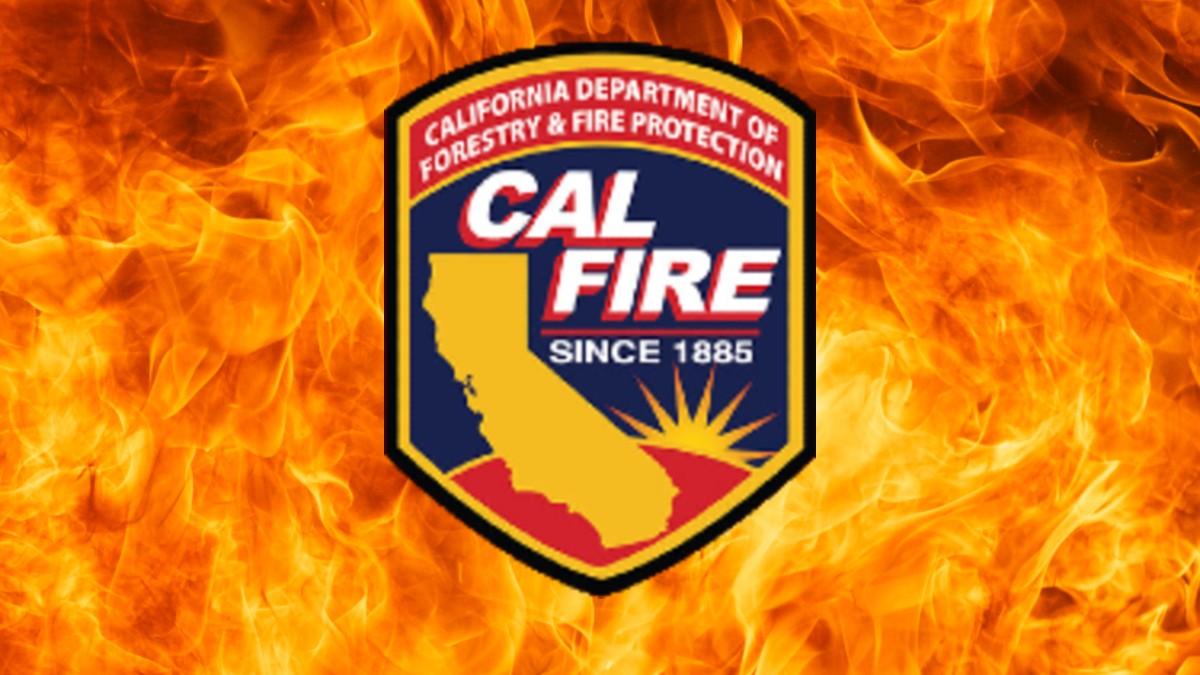
So it's gonna be cool. She's a beautiful dog. And Lena introduces herself to the audience. Yeah. So my name is Lena Strickling and my dog birdie, and I are a first responder therapy dog team. Um, I help run our nonprofit organization. We address the behavioral health needs of first responders through the use of therapy dogs.
Um, so we started with one dog in California and then birdie came on and that we have 47 dogs in 13 different states. So doing our best to. Strike out the stigma of mental health around first responders and make sure that they know it's okay to ask for help and to not be okay. And dogs are the easiest way to do that.
They're cute and fluffy and you don't have to talk to them. You can just come in and cuddle them. And, um, it's always a good time whenever we get to go. So we do station visits. And, um, critical incident debriefs Memorial services. And then we live in California. So we're getting ready for a big wildfire season.
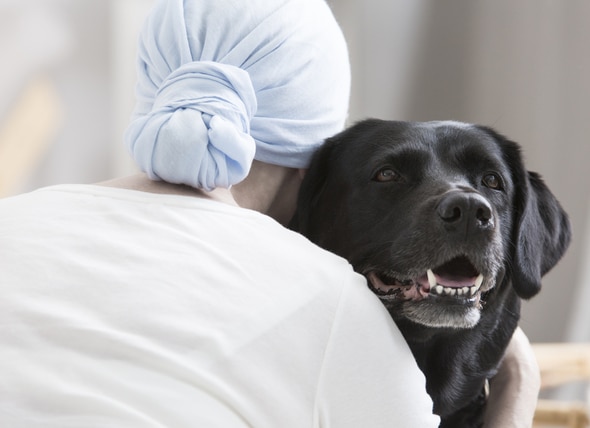
And we work with the forest service in Cal fire to go to base camps, to visit first responders. So we work with fire, police, EMS, sheriff dispatch, um, CHP, any kind of first responder. We're always there for them. Yeah. That is so awesome. To be able to bring your dog into the station or to. Better even to the deployments to bring some just when you're at base camp and at these larger fires, have these dogs come through and just give you some time to take a break mentally and, you know, play, play with a dog and probably brings back a lot of people's memories of home.
Um, when they're out there, cuz they, a lot of, so many people have animals now and having the dog come through and just being able to love on it, you know, is a, is a good break. Yeah, we're always excited. So we usually start our day about, about six in the morning, um, when the next line is coming out. So we'll go for breakfast, which Brody's always excited that she gets there for breakfast.
She always gets some treats from them, cuz she's so cute and eggs and they're like, we can't not give it to her. Right. And so we get them ready before they go out on their shift. So it's always a good way to start the morning. They're getting ready and packing and getting their assignments. And just to kind of break up that monotony, especially when you're on a three week deployment, you've been out forever and you miss your family and you're tired and you haven't slept and you're eating gross food all the time.

Not the most fun. Yeah. So it's always excited to get out there. We have at least one dog at base camp, but sometimes we have. Few and you know, there's hundreds of firefighters there. So we spend the first few hours of the morning visiting everyone. Who's about to go out on the line. Um, birdie always kind of knows the people that need her most, you know, we, there are so many people there and she will be lying it straight for someone.
Um, and she knows like, even in a huge group, she's like, this person needs me right now. And then. As soon as she feels like they're good, then she'll move to the next person. But she'll hang out with someone until she feels like they're in a good spot. And then we will hang out and take a break for a little bit and then wait for the people coming off the line, um, and visit them as they're cleaning up and getting ready to go back to their hotels.
Just making sure they're all feeling. Okay. Um, making sure. They get a little break and get some puppy love in them before they go get their 24 hours off. Yeah. And we've had so many great experiences of people. Birdie has her own Instagram. If you wanna follow her it's therapy bird and you know, every dog made an Instagram.
Right. Right. So we've had like a lot of very sweet messages from family members who have DMed us and been like, that's the first time I've seen my husband smile in weeks or. He called me after to tell me all about it. And he's so excited. We have baseball cards for our dogs, so they always get some baseball cards for their kids.
So I FaceTimed so many families with birdie. You know, they get so excited when they see you don't normally see a dog at base camp. This is kind of a new thing. So they're always excited and. It's really nice to watch their faces light up when we come in. And it's a huge honor to know that we can make that kind of difference, you know, with just a little shepa doodle the joy that she can bring to so many who are having such a rough time.
Um, yeah, it's been a great experience. We've been doing this about a year and a half and it's been a huge joy. Yeah, that's a huge growth in a year and a half to get so many dogs into so many states. That's impressive. Congratulations on doing that hard work to do that. And it's you and having a great tie with Cal fire to, to be able to go in and, you know, work with the men and women come on off the line to yeah.
To do, to give them some love. Right. It's it's not easy job by, by any means. Yeah. Especially in California, they get worked really hard and they're tired and we do need to break things up, you know? It's so much focus on fighting the fire and grinding every day and right. That's not always the most healthy.
And so we're excited to come in and break things up and give them a chance to just relax and have fun and something you don't always get at base camper when you're out on in a long deployment. Um, and then it's here to, you know, everyone's Mando and they're tired and they wanna go home. So we're excited to still do station visits with our dogs.
And, you know, we wanna check in on the people who are still back home cause they. Are also having a hard time and missing home and needing breaks just to feel like every year it gets harder and harder. So we're excited that we keep growing and that we have so many dogs. We just got two new dogs certified yesterday.

Wow. So we're excited at this pace we're growing. You know, we started in 2020 with one dog and now we're at 47 and. It's just made a huge impact. And I always love the stories I get, um, either through Instagram or email or that our handler share of the difference they're making, especially we've unfortunately had a lot of line of duty deaths in California recently.
Um, so being able to go to the Memorial services or, uh, a few months ago, birdie and I were able to go to Salinas and visit every agency that was on a call of a line of duty death, um, and be able to help them because. Hard and, you know, these are our heroes and our tough guys, and they don't always wanna ask for help.
And they are always like just compartmentalize and move on. And, um, we see that that is not the way to do things. And so I think, you know, like therapy's pretty hard to start. But with dogs, like I said, you don't have to tell them your problems. And there's been so much scientific research coming out recently of the impact of therapy dogs on first responders.
And so it's a good first step of them being like, okay, I can relax and I can be vulnerable and we can talk. And then that's kind of leads them into getting the help they need. So anytime we can help someone with that process or help them heal is a huge honor. Cause they're those. And we wanna take care of them.
Yeah, we, and we appreciate it. We appreciate the, all the efforts that are made by, um, organizations like yourself to help first responders, you know, have better mental health and better mental health serves. Not only just us, but all the people around us and make so, so we can do our job more effectively.
Yeah. Lena, you have had your own health challenges and your own challenges with, uh, Mental health and PTSD as well. Do you want, could you talk about that a little. Yeah. So I have an autoimmune disease. I have Crohn's disease. I was diagnosed when I was nine and I'm 25 now. So it's been quite some time dealing with that.

Um, and some of the experiences I've had with my treatment have led to anxiety and depression and PTSD. Um, I've also had unfortunately been involved in some shooting incidences that have. That have caused more PTSD. Um, so I have a pretty big background in mental health. I have worked really hard on getting help, which has been hard and also taking classes, um, and finding better ways to deal with my mental health and also have decided to go on medication, uh, when it was just too much for me to handle.
And I think that was literally a hard pill to swallow, um, knowing. You know, like sometimes you need help and you can't handle it all yourself. And I have valid reasons for my feelings. And, um, I think that's helped me a lot with my work, having a lot of compassion for how they're feeling, you know, we have different reasons for our PTSD and our mental health issues, but the root is the same.

Um, I always say it's therapy for me because I get to talk about what's going on with me and we can kind of share and bounce ideas off of each other and talk about ways we're coping or. Different like medication options or different ways to handle how we're feeling. And I also think talking is hard, but it's the best way, um, to get help and to kind of release those feelings.
It's hard to keep it all in all the time. Um, unfortunately with having a chronic illness that has no cure, there's a lot of unknown and I feel like that kind of unknown causes a lot of anxiety. Um, luckily I just, well, not, luckily I just spent three weeks at the hospital and just had surgery. This is the surgery I've been waiting for for a lot of years and should hopefully help me get into remission and get in a better place.
And then I feel like. When I have things more under control than my mental health is under control as well. Um, but I've been able to take like a 16 week course in PTSD skills, which has been super helpful and also helps me with my work and handling, um, other people's PTSD, cuz we do run into a lot of people struggling and they do wanna share.
And so it's helpful for us. We also have our handlers take, um, Psychological first aid classes and always are looking for ways to incorporate mental health education into our practices that we can be as effective as possible, even though we're not psychologists or counselors or anything. Um, we want to be able to help in any way we can.
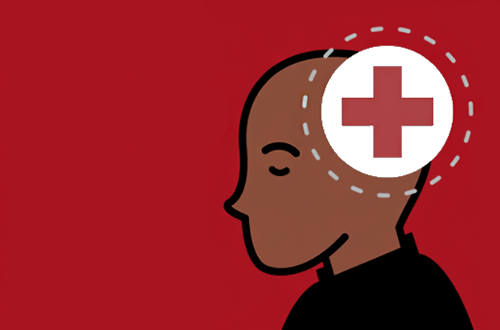
Yeah. And I, and I, I don't think you have to be a psychologist or in. Have those degrees to help other people. I think there's a lot to be said of going through struggles yourself and being able to take some of these classes and then being able to, like I said, bounce, bounce feedback, but like, Hey, I've been struggling with this and you're struggling with something similar and Hey, I've got some ideas to, to run past you.
And I think that's, that's what really, I feel like opens the door and the vulnerability is like, you don't, you don't have to be cert you don't have to have that certification to just show the compassion and, and, and love and, and the knowledge that you've learned. Yeah. It's definitely been a good experience, you know, like the first time we visit.
Everyone's sometimes standoff-ish. They're like, we don't need dogs. We aren't soft. That kind of thing. Yeah. Um, they're kind of tough. And then our dogs come in and they're all pretty cute. So then that breaks down and then the more we visit that station, the more we can kind of be vulnerable with each other, which is a super special experience.
I have a lot of really tight bonds with so many first responders. Which is also nice. I feel like I can speed in like 12 different counties without giving it to . Um, and I know they've always got my back, especially my health journey. They've been super kind about reaching out and checking in on me and Birdie's had some health issues as well.
We both have gut issues, so we're made for each other. Right. Um, and like all the police officers, associations have offered to help pay for medical bills or anything. We can't cover with Birdie to get her back in the field. So. It's nice to have those tight bonds with so many great people. And, you know, like some of my heroes and I'm proud to be their friend and to see how hard they work and to be able to bring some joy into their lives.

And it's always great when they get excited to see birdie and we get to hang out at the station. Birdie loves a good Lazyboy. She just sometimes on Sundays, we just go to the station and hang out and watch football. Um, it's a good chance for them to break things up and for us to get a stronger bond. And then when things do happen and they need us, then they feel comfortable calling us, which is great.
Yeah. I, and I think you're right, like establishing that bond first before something happens is, is very critical, cuz it right. The walls are down a lot lower. It's always nice. Like it's a really good feeling when they do call us, cuz then we know we've, we've kind of, weezled our way in, feel confident in, you know, like my ability to keep things to myself and to keep things confidential, but to be able to talk and um, get some puppy love at the same time, which we'll see ready.

Come here. We'll see if she come in. Hi. She's like I did so many other times, but you weren't watching. what is sweet? There we go. Thanks. Oh yeah. She is a beautiful dog. It does make me wanna like reach through and, and pet her. Yeah. And she's just, and she has just like, you can tell when a dog, like you have that bond, she just wants a love on you.
Put your pressure on, you just is to, to fill you and to be close to you. She definitely loves a good sample and she's soft. So it's good grounding for them as well. And she's always ready to give a hug and a kiss. Lay on a lazy boy and jump on you even she's naughty. She loves and she's like, it's hard to be naughty at the fire station or wherever I go.
Like no one really wants to discipline me. They want her all over them. And then I'm like, oh, then we go to the hospital and she's crazy. And I'm like, this is not the place to be crazy. . But she definitely loves her work. You know, we've been having to take a break because of her issues and then my issues.
And, um, we got to swear in the new police chief last night and she went crazy and was just so excited to be back at work. , we're always excited, you know, like if there's ever a time when she doesn't wanna work, I would never push her because she's not gonna do it and they're not gonna be into it. But she's just so full of love.
She's born on February 14th. So we say she's like our big love baby. Yeah. Yeah, for sure. And so it's always great how much she loves to do the work. And, um, we've been working on a lot of training, so she has been training to be my PTSD service dog, which I feel like has also helped with our work. So learning heat, pressure therapy, and signs of an anxiety attack and all of that, um, has been super helpful.

So we're always training. It never stops, but we know how effective it is and how big of an impact it's making. So it's always worth it. Yeah. And do all the dogs live with the handlers? Yes. So they're all owner trained and they all live with their own dogs. Um, we have had the opportunity. We've had a lot of people reach out with puppies, wanting to donate.
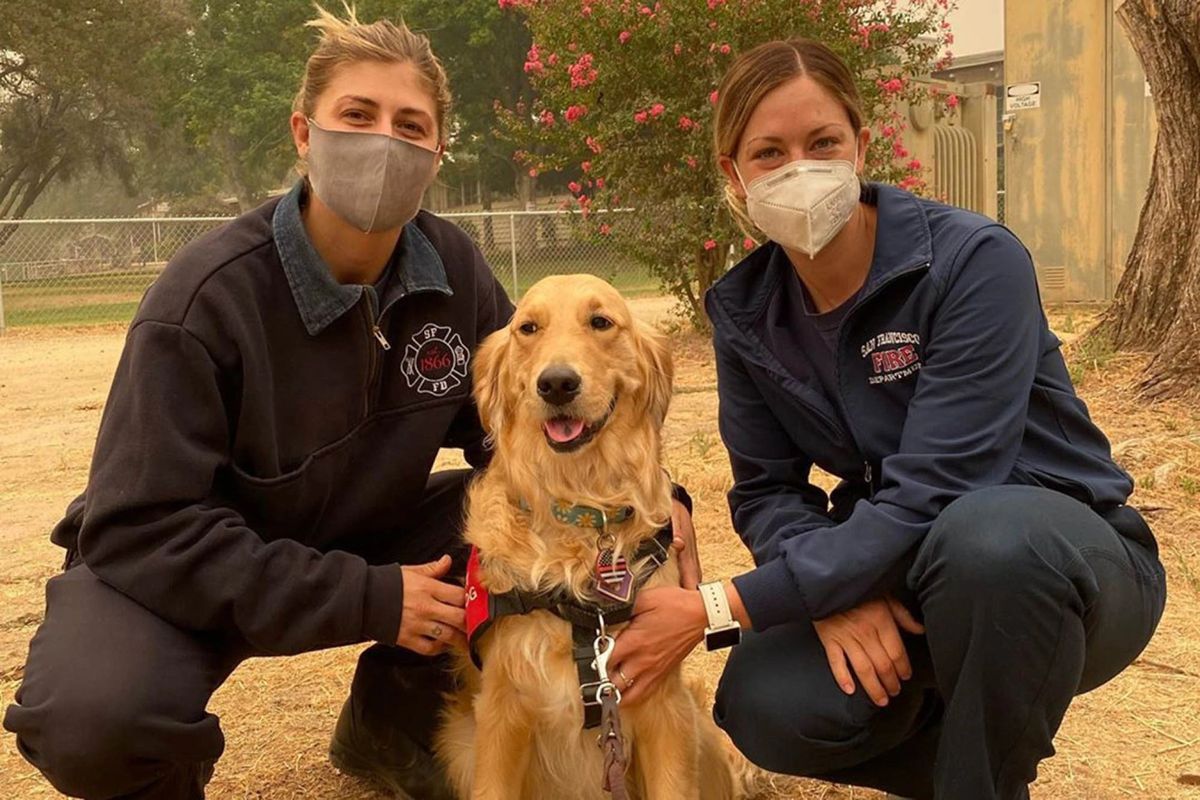
Do have, which I'm like, yeah, give me a puppy. I don't need more dogs, but had some really cute puppies that people wanna donate. Um, but we do have all of our own dogs that we train, but we have had, um, one dog from. Guy dogs for America that they donated a puppy that they didn't have a trainer for. And so she's MCC, she's in training right now.
She's still a puppy. She has a few more months until she'll be certified. Um, but yeah. Yeah. How does an organization like, like yours? Like maintain like that. There's a lot of travel and expenses and things going on. How do, how do you, how do you do that? A lot of fundraising. Um, so that's been our, our biggest thing during fire season, the money comes pretty easily because there's a lot of media going around and we're out so much and posting a lot.

That makes it a little bit easier, but the off-season can be kind of slow. So we do a lot of like t-shirt fundraisers and din donates. And whenever our dogs have birthdays, our goal is to always raise how much money they're turning. Um, so we just did care if our main dog just turned four. So we were able to raise $4,000, then got matched by a donor.
But it is expensive. Um, it's expensive to certify a team and get all their gear together and get them ready to go out. And then base camps are expensive. We have hotel costs and mileage costs. Um, same with station visits. We do all of our handlers are volunteers, but we do reimburse their miles. So it's always difficult.
You know, I've done, I have a background in nonprofit, so doing a lot of grant writing, but it's always getting the word out and fundraising, um, especially for fire season is our most expensive time. Cuz we do try and have a team at every fire at all times. So we usually rotate every two to three days a new team comes out.
Um, but we've been super fortunate. Like when I go to book an Airbnb and they ask why you're coming and I'll tell them we've had a lot of comps or discounts, which has been awesome. Um, a lot of people want to support us, but it's always a grind to make sure we have enough money in the bank to keep working, especially as we grow and expand and have so many teams.
Now, it gets more expensive every time, right. Pulling up the work we're doing is vital and important. So we do put a lot of effort into fundraising. Yeah. I would feel very hard not to support something like that. Like that's out doing, you know, so much good and you physically can see the good that they're doing.
And it's, you know, if you're, if you're missing this out and you're watch, you're listening to it, not watching it. And you're missing birdie, you know, you just want to support this Lena and birdie to get out there and, and do that. Good. And it's, that is such a grind.
During fire season, um, Cal fire works a little bit different than some of the other fire agencies, you know, Cal fire's 24 on and 24 off, which is a whole different, you know, type of grind. Um, my deployment in California was 16 on basically, and then eight off. So they both have their different types of, grind that they, they, they, they put on you and you're, you're away from home.
And, you know, you're the accommodations for, for us that are traveling out to, to California in general, we're just sleeping on the ground wherever we can. And, you know, uh, it's, it's hard to find some of the bright spots, especially if you're in areas where you can't communicate with your family. Yeah.
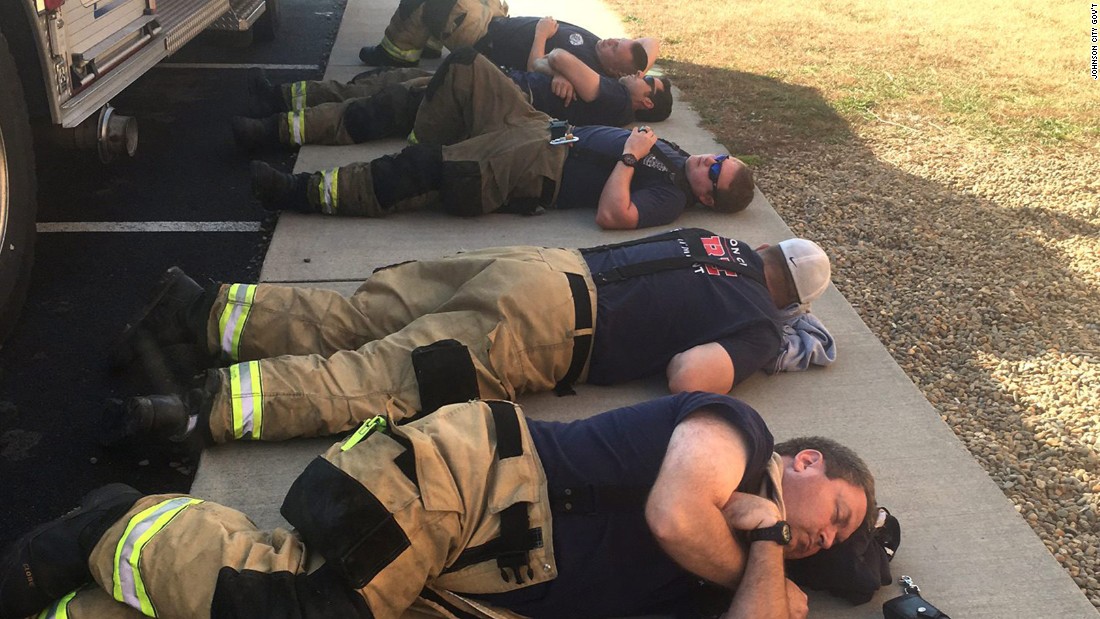
We were in Tahoe last year and had the opportunity to go to both Tahoe base camps. And, uh, that was like the mid-fire season. And I feel like that's when people are starting to hit their walls and, um, you can definitely see how tired everyone was. And it was a really hard fire. And, you know, in Tahoe, Tahoe, there are so many mountains, so you're also climbing all the time and they were exhausted.
And. It was for service and Cal fire. So there's a lot going on and everyone's exhausted and dirty and gross. And I always have to bathe dirty cuz not only does she smell like smoke, but she's so dirty after cuz everyone's dirty. And so like best turns black and you know, everyone's just tired. And that was probably one of the fires where we made the most impact and we have some teams out there.
So we were able to be up there a lot, which was. And a lot of us had family up there. So we were able to stay for free, which meant we could go more often. Um, but I feel like that's the fire. We got the most messages of like my husband was done. And then we saw you guys and that made such a, a difference and gave them a big boost to keep going and finish out their deployment and get home.
So it's always a special feeling to know that, you know, you guys are grinding so hard and you're exhausted and tired and hurting and hungry, and we're able to come in and at least make you smile for a few minutes before you have to get back at it. yeah, no, that's very much, very much appreciated and obviously making an impact.
![]()
And then you're saying that um, each one of the dogs, uh, has their own baseball cards. Yes. So that's kind of our exciting thing and it's fun. Fire season goes on and you see the same crews you'll see in their cars. It's just all the dogs lined up. on their, on their windshield and they always wanna collect 'em all.
So, you know, I'll tell them like bird's coming this week and then moose and re now are coming after me. So make sure you see them and get their card. Um, and something special. They get to bring home to their family. They're always asking for extra for their kids too. And we have stickers that they put on their helmet.
So. They're always like, I get to bring birdie on the line with me and we can't wait till we get to see her in person, but just getting to see her face on her card is special. Um, and it's fun for them to, you know, we have like all of their stats on the back and their Instagram, so they saw them. And, uh, there was actually research done about even just getting to look at a picture of a cute dog can help, uh, with your mental.
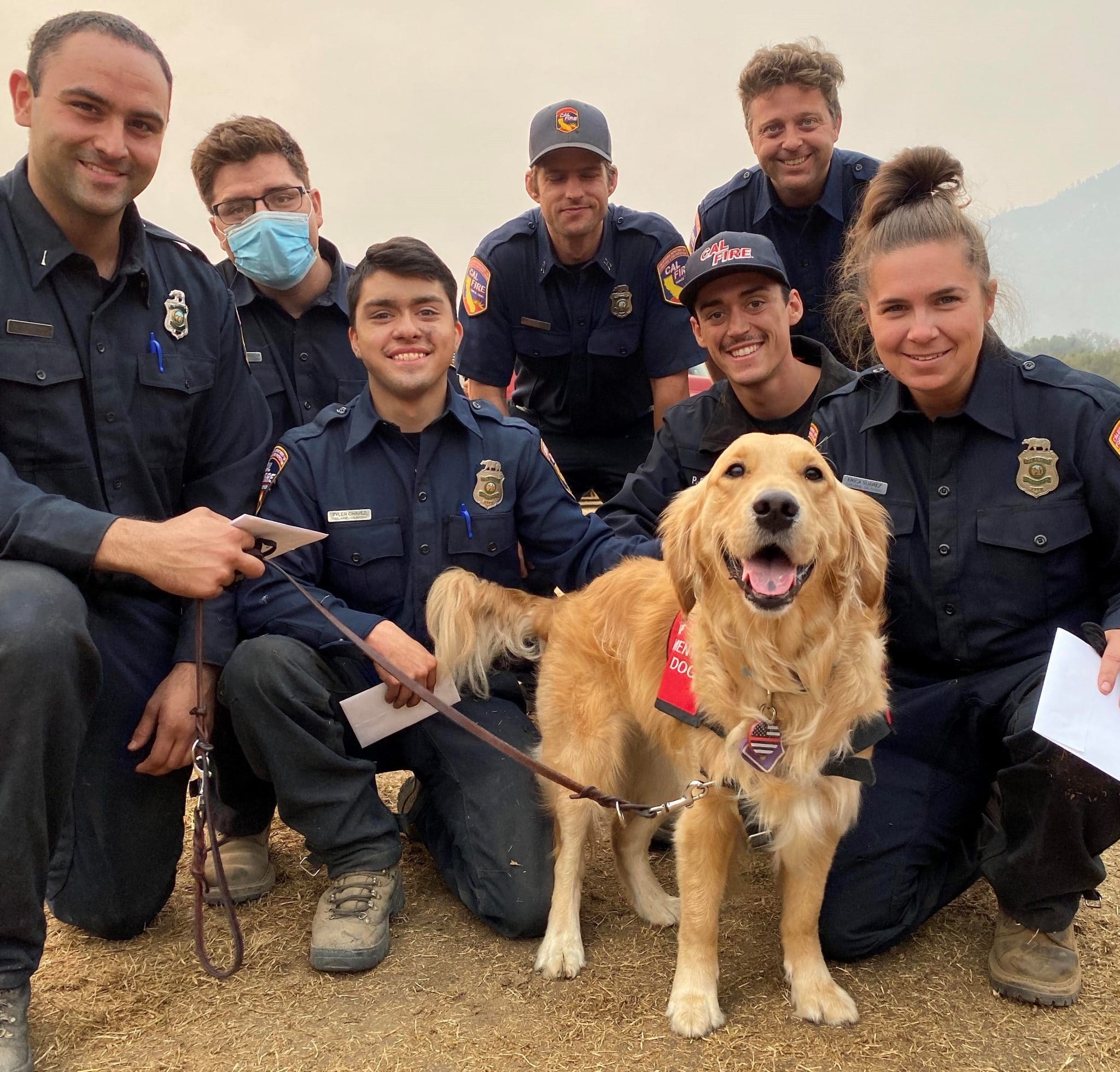
So something for them to carry with them in their backpack and keep them going while they're on their line so that we can see them again in person. Yeah. Why are dogs so good at, at their job of doing. I think they're just so full of love. Like we have some dogs that we joke that can't even contain how much love they have in them.
They want to like be on you in a part of you. Um, they have these huge smiles. I'll have to show you a picture of birdie back at work yesterday. She was so excited and have the biggest smile on her face and you see their tail wagging and you know, they wanna be there and they wanna love you. And. Some of our dogs just can't even let you go.
Like, they'll just stay there and sit on your feet and tilt their head back and look up at you with their little puppy, dog eyes, and you can't help, but love on them. And they're all soft and cuddly and they just want to be there with you. And you know, they love you and care about you and can take some of the edge off and hopefully lower your blood pressure, increase your dopamine and get you back out there and feeling good.
Yeah. Why is that? They want that direct contact with. I don't know. I think, well, our dogs love attention for sure. So, you know, you can't train a dog to be a therapy dog. You can train the obedience, but you can't train a dog wanting to love other people and being so accepting of strangers. And, you know, you have to get past that fear and.
Um, we're always running into engines and sirens and you know, when you get to base camp, then you have type threes and there's all these different things. So our dogs are pretty good at adapting to all of this and they just want to be there. Like they all love people so much. I know, since I've been sick, Birdie's been so bored at home.
And anytime anyone comes visit, she's like, oh finally, like someone different on and yesterday she was just running everyone. You know, we. Seen Nevato PD in a while and they love her and they get their high pitch, you know, like these big, tough guys get their high pitch forces and they're like, oh. And so she just gets jazzed and will run up to them and jump on them and love on them.
And she just, you know, she also creates these relationships with these people and she knows that they love them. So she wants to work hard because she gets all the attention and all those treats. And that's exactly what she's looking for. Yeah. Um, Definitely loves the attention and craves that attention, which we always joke on the days we don't have visits.
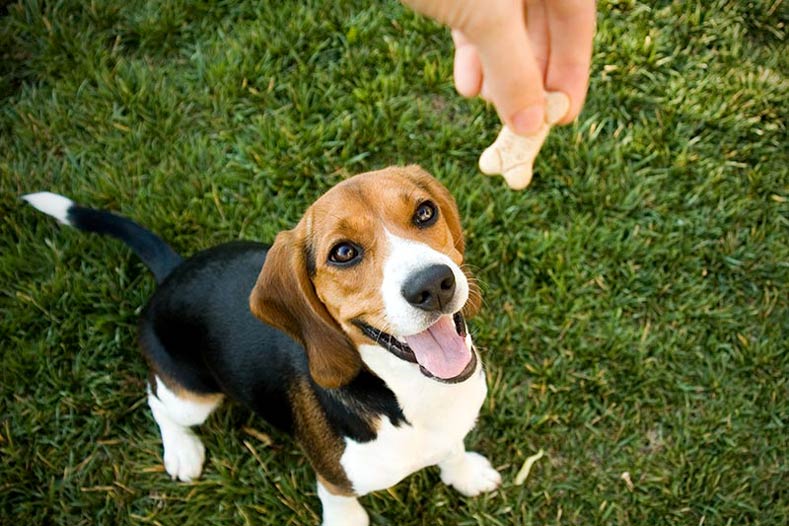
Like I have to pet her for two hours, right? Touching that level of attention every day. And, um, sheepdogs are actually like pretty big on attention and human contact and bonds. Um, same with poodles. So she's definitely a good breed for that. We have a lot of Goldens and labs who also love people. Uh, yeah, they all just want that attention.
It's a little overwhelming. Sometimes I bet you to get to them when they don't get it, but it definitely fills their cup and, you know, they'll come home and take a good nap and they're like, yeah, that was a good day. Like got to see all my friends and got pep. Normally get some kind of treat they're not supposed to have.
And they're like, yeah, let's do that again. Right, right. They're not dumb. They're not dumb. they're like, this is life. I mean, she has the hardest life. She like gets fresh dog food every day and then gets pep by a hundred people and then gets to go home and take a nap. And she's like, yeah, I like this job.
Yeah. I'm sure it takes a ton of energy from you to, to be out there doing that. How do you manage your? Yeah. So base camp is definitely a challenge. You know, we're up at about six, um, or five 30 to six. So we can be at base camp by the time everyone shows up and then we are walking around and, you know, I feel like talking to people for a long time too, kind of takes the energy out of you.
And sure. We always kind of talk about how our dogs. Absorb that negative energy and take it away from them. So they get pretty tired too. We're usually off the line by noon and we'll go home and get that, get a bath and get a snack. And then we usually nap the rest of the day. I always feel bad. Like we work hard in the morning and you guys go out on the line and I go home to an Airbnb and take a shower and eat real food.
Sleep. Um, but yeah, it's usually like a pretty hard recovery. I have a lot of props to you guys who stay out on the line, cuz I get pretty tired and normally we'll be there for about two or three days in the drive home. I'm like trying not to fall asleep and then we sleep pretty hard. The next few days, you know, takes a lot out of our dogs too.

Working really hard and taking that energy in and, um, somehow getting pet all day makes them really tired too. So they definitely zonk out by the end of the day and we make sure they get enough rest and not to push them too hard. But they will go until they can't go anymore, but we all kind of know our dog's body language and when they're done for the day, so we can call it, but they will go until there's no one left to pet them.
For sure. then they go take a nap, big old nap, and they extra food and they're like, yeah, that's a good day. Yeah. That's, that's very awesome. That is such a unique. um, way to form a bond with a, with a first responder. Well, it's becoming less unique. Um, you know, the dogs just being part, they were such a great part of the fire service in the beginning mm-hmm
And then, you know, as histories goes, you know, the, the dogs went away as the horses and horses went away and the carts went away and there may, maybe there was something really to that more than just the, you know, having the dogs around for the horses. That, that was good for the, the people that were working too.
It's been a, a really awesome last few years to see this transition to a lot of people getting stationed dogs, um, like big departments are getting dogs. I know Oakland police just got like eight therapy dogs, um, which is great too, because they use them as comfort dogs when there's incidents in the public as well.
So it's been great to see the use of therapy dogs come out and see the changes they're making. I think having a station dog, even though it is a lot of. Is a huge, you know, they're on the engine with you, they're running calls with you. They're always there with you. And I think that is a, a huge benefit and will make a huge difference.
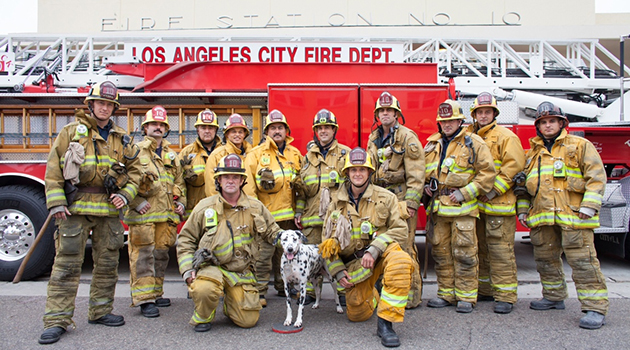
It always makes me a little bit nervous cuz I'm like, oh, now everyone's getting their own dogs. Yeah. And doesn't like, make us obsolete. But um, it won't, there's so much work to be done. , you know, there's plenty of dogs to go around and there's a lot of people who need help, but it is really exciting to see people being more open and you know, Dogs at base camps were never a thing.
And so seeing Cal fire kind of open up and they see a huge difference and it's been great for the people on the line to give Cal fire that feedback and the forest service, that feedback that that is what they want, um, make it nice. Cuz now they're calling us out, which is always what we want. Um, we work with ESS and so anyone can request us to come out and it's always a good feeling when they want us there.
You know, it's, it was definitely a struggle and it's still a struggle. Some departments are a little too tough where they have old guys in charge and just aren't ready for this kind of change. But, you know, we're, we're pushing it and working towards it because we know how positive of an impact it can make.
And like we said, before, we wanna get in, before something happens. So that they feel comfortable talking to us and calling us in when something goes wrong. You know, we always hope that there's never a critical incident, but that's part of the job and that's the way things work. And so we wanna be there when those things happen and hope we can have a tight bond with them so that they feel comfortable talking to us and we can work through this incident in a healthier way.
And hopefully, everyone can get back to it. Being in a better place quicker, so, right? So, and I'm excited for everyone to get their own station dog one day. Cause I know the difference it'll make, but for now Birdie and I will be out everywhere. It's it's a good mood. It's a good mood booster. You know, when you're, especially when you're out at base camp, it would just be just a good boost of your mood.
And like you said, you know, boost of the good hormones, you know, it, it just. All the good things come from that. Right. You just feel better. You work harder. Like it's just motivating, motivating to have some kind of normalcy into cuz I just, in my experience, like you're out there and then there's there's no, I didn't get a chance to see any dogs or anything like that.
But. There was just like, there was no like wildlife, like there was nothing, it was just dry, hot, dusty, dirty. Yeah. wasn't exciting. Yeah. Yeah. So it's, it's cool to have that. Um, very rarely do. Um, we have like a. A visitor dog, I'll call it at our station. We'll have a, one of the guys bringing their dog for like the day or, or 24 hours or something like that to come and hang out.
But yeah, it's and everybody's excited. It breaks up the normalcy of the, of the job. It brings some more of that humanity into, into the job. Yeah. There's always, definitely some mornings at base camp where my alarm goes off and I'm like, Ugh. I like don't wanna get out there. It's smoky, I'm tired. I stay in.
And then I'm like, okay, I know as soon as I see everyone light up, like it's gonna be a huge difference for me as well. You know, it's a huge mood booster for me and always makes me happy to see that my dog is making such an impact and to see everyone smile and get so excited and get those baby voices and all of that.
And, you know, especially when we get to see crews over and over, or we get to see crews from home up at base camp. It's nice to see the same people over and over again and see them light up. And, you know, they're like, oh, this is exactly what I needed. Like I just needed a break with birdie for a little bit just to yeah.
Keep going and keep going. So we know what's making a difference. Yeah. Yeah, definitely. How can people follow you? And then more importantly, how can people support? Yeah. So we have our main, Instagram is first responder therapy dogs. We have Instagram and Facebook, and then all of our dogs have Instagram as well.
So Birdie's is therapy underscore bird. And then you can kind of find all of our dogs through those Instagrams, cause we're all tagging each other. Um, so we post all of our visits and what we're up to and cute videos of our dogs. And yesterday Bridy went crazy at one of our visits. So we have a good reel of her, just so crazy in the grass after.
Which is always fun to see, even if you can't see her in person, you can still see her online. And then, um, our website is firstrespondertherapydogs.org, and that's where you can learn more about what we do in our teams and how to donate and how to support us as well. Awesome. Awesome. Well, I'm excited for you guys to grow and get more dogs out there.

Um, yeah, it is the season of wildland, um, of coming, especially for California, that seems to start a little bit later than other areas. Uh, but yeah, I mean, I'm, I'm sure. People from our state of Utah will be out there. They always are. Um, and maybe I'll be out there again this year. We'll, we'll see what happens, but if so, yeah, I hopefully, if I, if I do, I'm gonna try to make contact with you and, and see if we can set some come visit up.
That'd be great. Yeah. Let me know what fires you get deployed to, and we'll see if we can get a dog out there for sure. Awesome. Lena, thank you so much for being on. I really appreciate it. Yeah. Thank you so much, Jerry. It's been. Great. Thank you so much. Thank you. Thanks again for listening. Don't forget to rate and review the show wherever you access your podcast.
If you know someone that would be great on the show, please get a hold of our hosts. Jerry Dean L through the Instagram handles. At Jerry by and fuel or at enduring the badge podcast also by visiting the show's website, enduring the badge podcast.com for additional methods of contact and up to date information regarding the show.
Remember. The views and opinions expressed during the show solely represent those of our podcast part, the everyday heroes podcast network, the network for first responders and those who support them.

Lena Strickling
Associate Director
Lena is the Associate Director for First Responder Therapy Dogs (FRTD). For over 8 years, Lena has worked for nonprofits. She loves working for a greater purpose in causes that she believes in. This is a major factor in what led her to FRTD. When Lena was nine years old, she was diagnosed with a chronic health condition. Frequent hospital visits introduced her to the work of therapy dogs. These special dogs were a bright spot during her treatment and inspired her to one day become a handler. As her health worsened, Lena began dealing with serious mental health issues. After years of seeking treatment options, she finally started to feel like she was in a better place. Lena became passionate about mental health and learning how the brain works. She began taking classes, listening to podcasts, attending webinars, and finding ways to help and inspire other people struggling with both mental and physical health. Her love for therapy dogs coupled with her passion for mental health and close ties with first responders made joining First Responder Therapy Dogs an easy decision. You can find Lena and her dog, Birdie, working as a First Responder Therapy Dog team nearly every day of the week!











